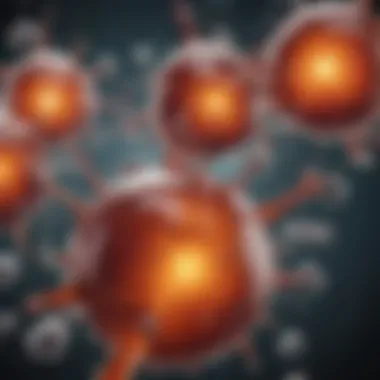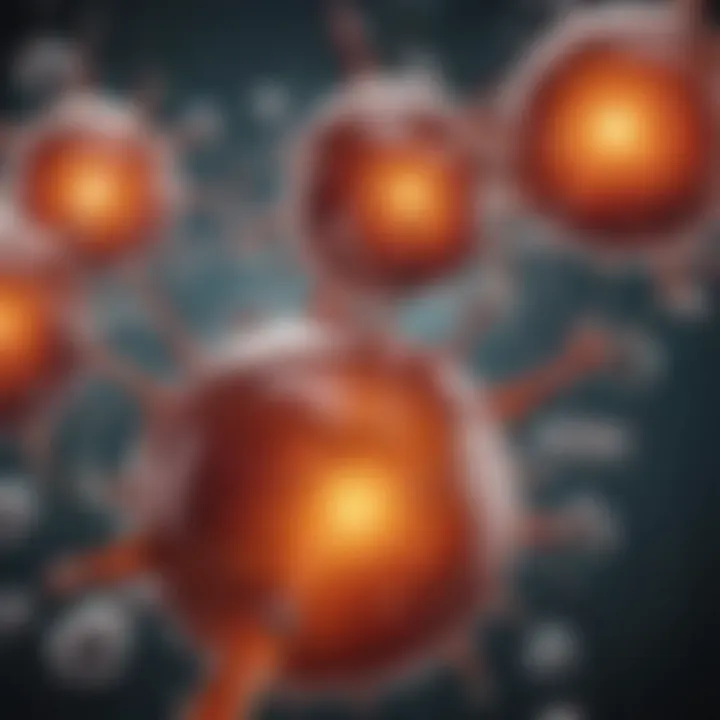Effects of Alcohol on Kidney Function and Health


Intro
The connection between alcohol consumption and kidney health is far more nuanced than many realize. The kidneys, being vital organs that filter waste from the blood, are not immune to the effects of what we consume. Alcohol, a common substance in social settings and celebrations, can throw a wrench into this delicate system if not consumed with caution.
In recent years, a growing body of research focuses on the impact of drinking habits on kidney function. From casual to heavy drinking, the varying degrees of alcohol intake come with distinct effects on kidney health. It’s crucial to weigh the potential risks against the benefits, and to understand how these choices play a role in both short-term and long-term well-being.
Understanding the mechanisms through which alcohol acts on the kidneys can illuminate the importance of moderation. This article seeks to peel back the layers of this topic, providing clarity and insight for students, researchers, educators, and professionals alike. Through a detailed exploration of scientific findings and practical advice on consumption, readers will gain a more holistic view of how alcohol interacts with kidney function.
Understanding Kidney Function
The kidneys, those remarkable bean-shaped organs, hold a pivotal role within our body's systems. Their significance extends far beyond merely filtering waste; they are integral to maintaining a delicate balance essential for homeostasis. Grasping how these organs operate is crucial, especially in context of alcohol consumption, as it helps understand the potential implications for kidney health.
Anatomy of the Kidneys
Each kidney measures about fifteen centimeters in length, roughly the size of a fist. Nestled against the back wall of the abdomen, they have a tough outer capsule known as the renal capsule and are divided into two main regions: the renal cortex and the renal medulla.
- The renal cortex, the outer part, is where filtering occurs. It houses nephrons, the basic functional units of the kidneys, responsible for urine formation.
- The renal medulla, the inner portion, is involved in concentrating urine to conserve water.
Imagine a coffee filter; it lets liquid through while trapping unwanted particles. Similarly, the nephrons, through intricate structures, conduct their filtering functions. Consisting of various parts, including the glomerulus and the renal tubule, these structures collaborate to ensure toxic waste and excess substances are excreted efficiently.
Role of the Kidneys in Homeostasis
Homeostasis refers to the body's drive to maintain internal stability despite external changes. The kidneys are central players here, regulating:
- Fluid balance: The kidneys determine how much water is retained or excreted, impacting overall hydration levels.
- Electrolyte balance: Essential minerals, like sodium, potassium, and calcium, are carefully controlled by the kidneys, influencing diverse bodily functions.
- Acid-base balance: Maintaining pH levels is vital for enzyme function and metabolic processes.
When a person consumes alcohol, the kidneys face various challenges. Alcohol can disrupt these processes, leading to dehydration or an imbalance in electrolytes, ultimately affecting overall health.
Filtration and Excretion Processes
The intricate processes through which kidneys filter and excrete waste consist of three key steps:
- Glomerular filtration: Blood flows into the kidneys, and the glomeruli filter out waste products and excess substances, while keeping larger molecules like proteins intact.
- Tubular reabsorption: As the filtrate moves through the tubules, essential nutrients and water are reabsorbed back into the bloodstream, ensuring the body retains what it needs.
- Tubular secretion: Additional waste products are secreted into the renal tubules for excretion.
This three-step filtration process turns waste-laden blood into urine, which subsequently travels to the bladder before being expelled from the body.
Understanding these fundamental functions is not just academic; it lays the groundwork for discussing alcohol's impact on kidney health. With a solid grasp of kidney function, readers can appreciate the nuances of how alcohol interferes with these essential processes, leading to various health issues.
Alcohol Metabolism Overview
Understanding how the body metabolizes alcohol is crucial for grasping its effects on kidney health. When alcohol enters the body, it undergoes a complex conversion process that primarily occurs in the liver. However, it also affects other organs, including the kidneys, which play a key role in filtering blood and maintaining fluid and electrolyte balance. By examining alcohol metabolism, we can gain insights into how excessive consumption can lead to various kidney dysfunctions and pave the way for informed choices regarding drinking habits.
How the Body Processes Alcohol
When a person consumes alcohol, the stomach absorbs it, and it rapidly enters the bloodstream. From there, the liver takes the lead in processing this substance. Enzymes, notably alcohol dehydrogenase, break alcohol down into acetaldehyde, a toxic compound. The body then transforms acetaldehyde into acetate, which is significantly less harmful. This acetate is eventually converted into water and carbon dioxide, which the body can eliminate. However, there’s a limit to how much alcohol the liver can handle at once. If someone drinks excessively, the liver may struggle to keep up, leading to harmful levels of acetaldehyde and increased pressure on the kidneys as they try to filter the blood.
- Key Steps in Alcohol Metabolism:
- Absorption in the stomach
- Conversion to acetaldehyde
- Transformation to acetate
- Elimination via respiration and urination
Despite this intricate process, the kidneys also play an indirect role in alcohol metabolism. They filter out waste products from the blood, including the metabolites of alcohol. Thus, when alcohol consumption is high, the kidneys experience added strain, leading to potential dysfunction over time.


Impact on Different Organs
Alcohol consumption doesn't just impact the liver; its effects ripple throughout the body. Different organs bear the brunt of alcohol's toxic properties, each reacting in unique ways:
- Liver: The primary site for metabolizing alcohol, excessive intake can lead to fatty liver, hepatitis, or cirrhosis.
- Heart: Heavy drinking can contribute to irregular heartbeats and high blood pressure, which in turn affects kidney health.
- Brain: Alcohol alters neurotransmitter balance, impairing cognitive functions and response times.
- Pancreas: It can trigger inflammation, which disrupts the digestive system and further stresses the kidneys.
"Understanding the interconnection between organs is vital in addressing the complications arising from alcohol consumption."
The kidneys are often seen as silent casualties in the battle against excessive drinking. As they work harder to filter out the byproducts of alcohol metabolism, chronic intake can lead to chronic kidney disease or other renal ailments. Recognizing the broader impact of alcohol on various organs allows for a more comprehensive understanding of its dangers.
In summary, the overview of alcohol metabolism sheds light on the physiological processes that place pressure on kidney function. As the kidneys strive to maintain homeostasis amidst the toxic effects of alcohol, they may eventually succumb to the burden of sustained high alcohol intake. Understanding this relationship is fundamental for developing strategies for safeguarding kidney health.
Direct Effects of Alcohol on Kidneys
Understanding the direct effects of alcohol on kidneys is crucial for anyone who consumes alcoholic beverages, whether in moderation or excess. The kidneys function as vital organs that filter waste, balance bodily fluids, and regulate electrolytes—all functions that can be severely impaired by alcohol consumption.
Impact of Alcohol on Kidney Functionality
When alcohol enters the bloodstream, it can influence kidney functionality in several significant ways. For one, alcohol consumption can lead to an increased workload on the kidneys. High levels of alcohol can restrict their ability to effectively filter out toxins. With acute alcohol intake, the kidneys might struggle to maintain their crucial balance of fluids and electrolytes.
Moreover, alcohol can lead to a temporary change in the glomerular filtration rate (GFR)—the rate at which blood is filtered through the kidneys. A suddenly elevated GFR may seem like a good sign, but this can eventually result in fatigued kidneys over time, diminishing their overall efficiency. Therefore, frequent heavy drinking often spells trouble for long-term kidney health.
Dehydration and Renal Stress
One of the most alarming repercussions of alcohol consumption is dehydration. Alcohol is a diuretic, meaning it encourages urine production. Excessive urination can lead to a loss of essential fluids, leaving the body dehydrated. This dehydration adds renal stress, pushing kidneys to work overtime to filter blood while trying to conserve water and maintain equilibrium.
"Dehydration can lead to a cycle of elevated blood pressure and hindered kidney performance." – A renal health perspective.
In chronic cases, this ongoing stress could foster conditions like acute kidney injury or further complicate pre-existing kidney disorders. Staying aware of hydration levels becomes essential for anyone who enjoys their drinks, as the body needs fluid balance to function normally.
Alteration in Electrolyte Balance
Alcohol consumption frequently disrupts the balance of critical electrolytes in the body, including sodium, potassium, and magnesium. Dehydration caused by alcohol leads to a dip in sodium levels, triggering conditions like hyponatremia. Such an imbalance affects not just kidney function but can also manifest in muscle weakness, confusion, and convulsions.
Additionally, the fluctuation of potassium is noteworthy. Alcohol can contribute to increased potassium levels in the blood, a condition known as hyperkalemia. High potassium levels can be particularly dangerous and may result in severe cardiac issues. Regular consumers of alcohol should be mindful of their intake, particularly those with health issues that affect renal health.
These multifaceted effects of alcohol on the kidneys highlight the vulnerability of these organs within the context of alcohol consumption. Understanding them aids in recognizing potential risks and encourages informed choices regarding drinking habits.
Long-Term Consequences of Alcohol Consumption on Kidneys
Understanding the long-term consequences of alcohol consumption on kidney health is critical for anyone who uses alcohol regularly. It’s not just the immediate effects that are troubling; it’s also the slow, insidious damage that can occur over time. The kidneys play a vital role in filtering blood, removing waste, and balancing fluids in the body. When alcohol enters the body, it poses significant risks, especially with chronic consumption. Recognizing these potential dangers helps individuals make informed decisions, fostering better health outcomes.
Risk of Chronic Kidney Disease
Chronic Kidney Disease (CKD) is a potential outcome for individuals who drink heavily over prolonged periods. Studies indicate that consistent high intake of alcohol can lead to kidney damage which might not show symptoms until it’s too late. The kidneys can become overworked from filtering out toxins, leading to inflammation and scarring. According to recent research, heavy drinkers have a higher rate of CKD compared to moderate drinkers. The key here is to be mindful that CKD often progresses quietly.
"Many people with kidney disease may not experience noticeable symptoms until they reach advanced stages, making regular check-ups important."
Hypertension and Kidney Damage
Alcohol can also significantly impact blood pressure. Chronic drinking often leads to hypertension, or high blood pressure, which in turn can seriously harm the kidneys. The kidneys regulate blood pressure through a complex hormonal mechanism involving the renin-angiotensin-aldosterone system. When alcohol interferes with this system, it can result in elevated blood pressure and further damage kidney function. Individuals already predisposed to hypertension need to be especially cautious, since the combination of high blood pressure and alcohol consumption can escalate their risk of kidney damage exponentially.


Development of Kidney Stones
Another significant concern related to long-term alcohol consumption is the formation of kidney stones. Alcohol can affect calcium metabolism in the body, leading to hypercalciuria—an excess of calcium in the urine. This condition increases the chances of stone formation. Furthermore, dehydration associated with heavy drinking provides a conducive environment for stone development. Kidney stones can cause severe pain and complications, requiring medical intervention. Therefore, it’s essential for individuals to consider hydration and consumption practices in their lifestyles.
In summary, the consequences of long-term alcohol consumption on kidney health are concerning. Recognizing the risk of chronic kidney disease, hypertension, and kidney stones underscores the importance of understanding alcohol's impact on the body and urges individuals to reconsider their drinking habits.
Differentiating Between Moderate and Heavy Drinking
Understanding the line between moderate and heavy drinking is pretty crucial, especially when discussing the implications on kidney health. This section shines a light on how the definitions and consequences differ, which ultimately aids people in making informed decisions about their alcohol intake.
Defining Moderate Drinking
Moderate drinking can often be seen as a relative term, varying based on cultural, social, and individual factors. The basic yardstick seen in places like the Centers for Disease Control and Prevention suggests that moderate drinking is up to one drink per day for women and two for men. Though simple in principle, factors like body weight, medication interactions, and personal health history play a significant role.
On the surface, moderate drinking may have a few perceived benefits. Some studies hint at possible cardiovascular perks, claiming it can potentially lower stress and create a social atmosphere that can be greater for mental health. However, one must keep in mind that even moderate consumption carries risks, particularly for individuals already susceptible to kidney issues. A drink here and there may not seem like much, but it adds up over time—like snowballs rolling downhill.
Consequences of Heavy Drinking
Heavy drinking, on the other hand, cuts a much darker figure. Often defined as consuming more than three drinks a day for women and four for men, the repercussions can pile up quickly. In terms of kidneys, the stakes are high. Excessive alcohol consumption can lead to dehydration, increased blood pressure, and the significant risk of developing chronic kidney disease. When the kidneys are consistently bombarded with high levels of toxins, they can start to wear down like an old engine trying to keep up on a long journey.
- Toxic Build-up: Heavy drinking may cause a build-up of harmful substances in the blood, stressing out the kidneys as they struggle to filter these out.
- Chronic Issues: There’s an undeniable relationship between heavy drinking and chronic kidney problems. The longer this behavior persists, the more likely kidney failure becomes an unwelcome acquaintance.
- Increased Blood Pressure: High alcohol consumption can lead to hypertension, a condition that is inflammatory to kidney cells and inhibits their ability to function properly.
Vulnerable Populations
Certain groups are more vulnerable to the effects of alcohol consumption on kidney health. These populations include individuals with preexisting kidney conditions, older adults, and those who are on medication that could cause harmful interactions with alcohol.
Stress might be part of life, but struggling with kidney problems while managing heavy drinking is a recipe for disaster. Here are some examples of vulnerable points:
- Older Adults: Aging kidneys are less efficient, making even moderate drinking risky for this group.
- Chronic Illness Sufferers: Those battling conditions like diabetes or heart issues are already putting stress on their kidneys. Adding alcohol into the mix is like throwing gasoline on a fire.
- Medications Interactions: Many common medications can interact poorly with alcohol, further complicating the equation for those who are already in a precarious health situation.
"The fine line between enjoyment and health risk can sometimes look more like a tightrope. Knowing where the balance lies is vital for kidney health."
Symptoms of Kidney Dysfunction Related to Alcohol Use
When discussing the influence of alcohol on kidney health, it's critical to shine a spotlight on the symptoms of kidney dysfunction related to alcohol consumption. Alcohol can be likened to a double-edged sword, where excessive intake can lead to significant long-term damage. Understanding the symptoms not only empowers individuals to identify potential kidney troubles early but also serves as a reminder of the intricate relationship between lifestyle choices and organ health. The kidneys play a pivotal role in filtering waste, balancing electrolytes, and regulating blood pressure; thus, recognizing any warning signs can be vital for maintaining overall health.
Recognizing Early Warning Signs
Early symptoms of kidney dysfunction might be subtle, yet they should not be brushed aside. Common early indicators include the following:
- Changes in Urination: This can manifest as increased frequency, urgency, or even a decrease in urine output. Pay attention if you find yourself rushing to the bathroom more often, especially at night.
- Swelling: The kidneys help regulate fluid balance, so any swelling in your legs, ankles, or around your eyes might signal that they aren't functioning well.
- Fatigue: Feelings of persistent tiredness or low energy can indicate that the kidneys are struggling to remove toxins from your blood, leading to a general decline in health.
- Back Pain: While back pain can originate from various sources, pain specifically near the kidneys can point to issues like kidney stones or infections.
- Nausea and Vomiting: Chronic kidney issues can create a buildup of toxins, which may lead to these gastrointestinal symptoms.
It's essential to be vigilant and not dismiss these signs as just a result of aging, stress, or too many late nights out. If these symptoms align with recent alcohol consumption patterns, it might be prudent to seek medical evaluation.
Complications Arising from Kidney Trouble
Allowing kidney dysfunction to go unchecked can lead to serious complications. Kidney disease is a silent killer that can sneak up on even the healthiest individuals, especially among those who drink heavily. Here are some of the complications that might arise:
- Chronic Kidney Disease (CKD): Sustained damage can result in CKD, which is hard to reverse and might eventually necessitate dialysis or a transplant.
- Electrolyte Imbalance: The kidneys are responsible for maintaining a proper balance of electrolytes. Dysfunction can lead to conditions such as hyperkalemia (high potassium), which can be life-threatening.
- Hypertension: High blood pressure is a significant risk, as compromised kidneys can lose their ability to regulate it effectively, leading to a vicious cycle of increased damage and worsened health.
- Cardiovascular Issues: Poor kidney function can elevate the risk for heart diseases, as waste build-up affects heart stability.
- Bone Disease: Kidneys activate vitamin D and help in regulating phosphate. Dysfunction can result in bone health deterioration, leading to osteoporosis.
"Ignoring the signs of kidney dysfunction is like playing a game of poker with your health; the stakes can be higher than you think."


Understanding these symptoms and complications enables individuals to take preventive actions. In the long run, it may lead to an emphasis on moderation in drinking habits, highlighting the importance of annual health check-ups. By addressing kidney health proactively, we can significantly reduce the likelihood of severe complications associated with alcohol consumption.
Preventative Measures for Kidney Health
Maintaining kidney health is critical for overall wellbeing. The kidneys play a key role in filtering blood, balancing electrolytes, and regulating blood pressure. When alcohol consumption enters the equation, the importance of preventative measures becomes strikingly clear. Ensuring that our kidneys remain in good shape can mitigate potential risks associated with alcohol and support their vital functions. Awareness and proactive management are especially important when considering both moderate and heavy drinking patterns. By adopting simple and effective strategies, individuals can dramatically influence their kidney health in positive ways.
Guidelines for Alcohol Consumption
Understanding what's considered safe versus risky drinking can significantly impact kidney health. The recommended guidelines, typically delineated by health organizations, serve as a compass for individuals navigating the effects of alcohol. Generally, the idea is moderation—keeping intake within recommended limits is paramount.
- Moderate Drinking: This generally means up to one drink per day for women and up to two drinks for men.
- Heavy Drinking: Defined as consuming more than that, which can lead to increased risks of kidney damage and chronic diseases.
Creating mental notes or setting reminders can aid individuals in tracking consumption. Moreover, situational awareness—being conscious of when drinking may be excessive—can be beneficial. Every drink counts and keeping an eye on total intake can foster healthier habits.
Maintaining Hydration
Hydration is often overlooked, yet it’s central to kidney function. Alcohol is a diuretic, meaning it can cause increased urination, leading to dehydration often without you even noticing. Maintaining proper fluid intake can offset some of the negative impacts alcohol has on renal health. Here are some hydration pointers:
- Water Intake: Aim to drink water before, during, and after alcohol consumption to help balance the dehydration effects.
- Limit Caffeinated Beverages: Caffeine can also exacerbate dehydration, so be cautious about mixing alcohol with caffeine-loaded drinks.
- Recognize Signs of Thirst: Don’t wait until you're parched to drink water. Regular sips throughout the day can help maintain hydration levels.
Regular Health Check-ups
Having routine check-ups isn’t just an old wives' tale; they are crucial for catching health issues early, especially relating to kidney function. Many people don’t realize that chronic kidney disease can progress without obvious symptoms, making it essential to keep tabs on kidney health.
- Lab Tests: Regular blood and urine tests can help monitor substances that inform kidney function, such as creatinine and electrolytes.
- Blood Pressure Monitoring: High blood pressure is both a cause and consequence of kidney damage. Keeping it within a healthy range can reduce risks significantly.
- Follow-Up: If consuming alcohol is a regular part of life, discussing it openly with healthcare providers can lead to personalized advice tailored to individual risks and needs.
Remember, prevention can't be understated. The more informed you are and the more proactive you become, the better your kidneys will fare over time.
By implementing these preventive measures, individuals can take control of their kidney health, ensuring they remain vibrant and functional for years to come.
Research Trends and Future Directions
Understanding the implications of alcohol consumption on kidney health is crucial, especially as trends in alcohol usage evolve. Research in this area is not just about identifying problems; it's about paving the way for better prevention and treatment strategies. Ongoing studies and fresh approaches can highlight the nuances of how alcohol affects kidney functionality in various populations. As the world shifts in its relationship with alcohol—whether that's through changing consumption patterns, awareness of health risks, or even new drinking trends—keeping abreast of current findings and future lines of inquiry remains essential.
Current Studies on Alcohol and Kidney Health
Research has increasingly focused on the connection between alcohol consumption and kidney health. Recent studies offer substantial insights, which can be categorized into several areas:
- Quantitative Impact: Many studies delved into how different levels of alcohol intake influence kidney performance. For instance, research has shown that heavy drinking correlates with elevated markers of kidney injury, such as serum creatinine levels.
- Pathophysiological Mechanisms: Understanding the mechanisms behind these effects can be invaluable. Some studies suggest that alcohol might disrupt normal kidney function by altering blood flow and impacting nephron health.
- Clinical Observations: Observational studies on populations with varying drinking habits reveal a concerning trend: chronic drinkers often present with kidney-related issues, which further underscores the need for robust preventive measures.
"Staying updated with the latest findings is key to appreciating the complex relationship between alcohol and kidney health."
Emerging Research Questions
As the field progresses, several questions remain unanswered, paving the way for future research. Some pressing themes include:
- Longitudinal Effects: How does prolonged moderate drinking affect kidney function over decades? While we know the risks of heavy drinking, the long-term implications of moderate consumption are still not fully understood.
- Genetic Factors: Is there a genetic predisposition for certain individuals that affects how alcohol impacts their kidney health? Understanding genetic markers may lead to tailored recommendations for alcohol consumption.
- Intervention Strategies: What preventative measures can effectively mitigate kidney damage in those who consume alcohol? Identifying practical interventions could be a game-changer for at-risk populations.
- Societal Trends: As lifestyle changes influence drinking habits, how will this affect kidney disease statistics in future generations?
By honing in on these emerging questions, researchers can guide future inquiries and strategies aimed at safeguarding kidney health across different demographics. Continuous exploration in this field highlights the intermingling factors that play a role in alcohol metabolism, kidney health, and overall well-being.
Closure
In wrapping up the discussion on alcohol consumption and kidney health, one must recognize the intricate relationship between the two. The kidneys, vital organs responsible for filtering waste and maintaining electrolyte balance, are significantly affected by the body's alcohol intake. This article has peeled back layers of complexity surrounding how alcohol metabolizes within the body and pinpoints its direct and long-term ramifications on kidney performance and overall health.
Summary of Key Points
- Alcohol and Kidney Function: It is crucial to understand that alcohol can alter kidney functionality in both acute and chronic phases. Acute kidney injury is a potential risk following excessive consumption, while long-term abuse can lead to chronic kidney disease.
- Hydration Matters: Alcohol dehydrates the body, placing additional stress on the kidneys to maintain balance, increasing the risk of kidney stones and deficiencies.
- Electrolyte Balance: Changes in electrolyte levels are significant, as alcohol can disrupt sodium, potassium, and other essential balances that are vital for kidney operation.
- Risk of Disease: Heavy drinking is strongly linked to a plethora of issues including heightened blood pressure and the development of chronic illnesses that can further compromise kidney health.
- Moderation vs. Excess: It’s essential for individuals to distinguish between moderate and heavy drinking, acknowledging that what is moderate for one person may not be the same for another, depending on various factors like age, weight, and existing health issues.
- Preventative Strategies: Emphasizing responsibility in alcohol consumption can safeguard kidney health. Simple strategies such as regular health check-ups, staying hydrated, and following established guidelines can significantly mitigate risks.
Ultimately, the information gathered here serves as a reminder of the delicate interplay between lifestyle choices and organ health. The stakes are high, and understanding alcohol's effects on kidney health not only has implications for individual choices but may also inform broader societal discussions about alcohol consumption norms. Protecting kidney function through mindful drinking habits can create a ripple effect, promoting a general state of well-being.







